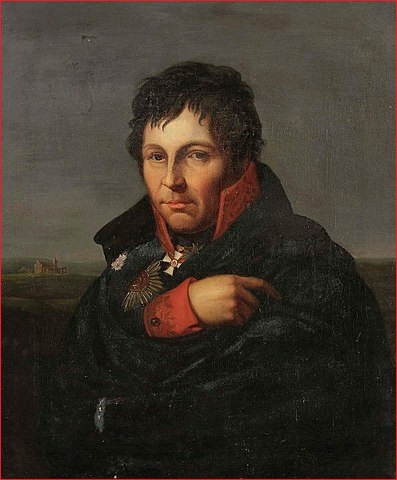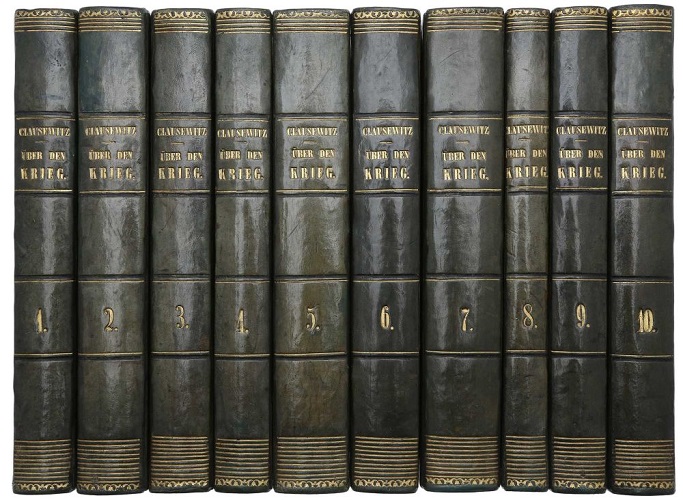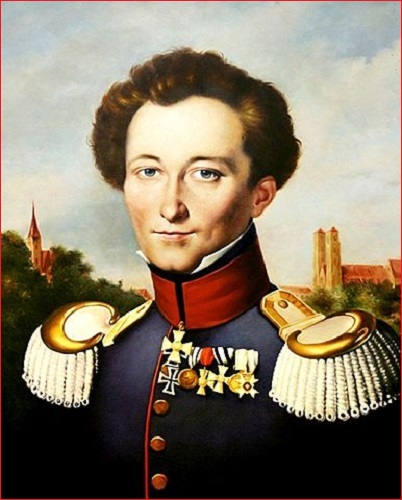|
● ● ●
Introduction
No student of military history can bypass Carl
von Clausewitz’s On War, without doubt the most famous—and
controversial—treatise on the subject ever written. The
sophistication of Clausewitz’s approach and the depth of his
analysis have never been surpassed—but these very qualities have
caused readers and critics to misunderstand or even distort his
philosophy of war. For philosophy of a kind it surely is: rigorous,
systematic thinking in pursuit of the truth. What is war?
Clausewitz asks. He spent his life in a quest for the answer.
In an article of this length the thesis of
On War can only be outlined. For the benefit of readers
seeking more information, a bibliographical note is provided.
Biographical Sketch
Carl Philip Gottlieb von Clausewitz was
born on 1 June 1780 at Burg bei Magdeburg in the Duchy of Magdeburg,
a province of the Margraviate of Brandenburg,
itself the core territory of the Kingdom of Prussia. He was the
youngest of four sons. His father, a former Army officer, was
employed in the Prussian revenue service. His family claimed noble
status on the basis of descent from the barons of Clausewitz in
Upper Silesia—a claim that while dubious was eventually recognized
by the King of Prussia. Clausewitz entered the Prussian Army in 1792
at the age of twelve, his rank of lance corporal (Gefreiterkorporal)
marking him out as an officer candidate. After two years of service
in the ranks he was duly commissioned as an ensign in the
prestigious 34th Infantry Regiment, whose colonel-in-chief was
Prince Ferdinand of Prussia, the younger brother of Frederick the
Great.
In 1810 he married
Countess Marie von Brühl, the daughter of a socially prominent
family. This match, which proved exceptionally happy, put Clausewitz
in touch with Prussia’s leading literary and intellectual figures.
Marie, who was well educated, also was influential in her husband’s
intellectual development. After his untimely death she edited and
published his complete works.
Clausewitz served throughout the
Revolutionary and Napoleonic wars and was closely involved in the
Prussian reform movement that sprang up after the country’s
catastrophic defeat at the hands of Napoleon in 1806. He became an
aide to Gerhard von Scharnhorst, the moving spirit among the
military reformers who sought to rehabilitate and modernize the
shattered Prussian Army. This proved professionally unfortunate for
Clausewitz, since many of the proposed reforms were bitterly opposed
by the conservatives around King Frederick William III. The young
officer acquired the reputation of a liberal, and this to some
extent blighted his career. As a soldier and a Prussian patriot,
Clausewitz passionately aspired to high command, but the King's
suspicion of him frustrated that ambition. Clausewitz saw a good
deal of active duty and witnessed much history. That he himself never had
the chance to make history on the field of battle was a bitter
personal disappointment.

Portrait of Gerhard von
Scharnhorst by Friedrich Bury (Wikimedia Commons / Public Domain)
Even so, Clausewitz had a respectable
military career. The wars over, from 1816 to
1830 he served as director of the Prussian War Academy (Kriegsakademie),
eventually rising to the rank of major-general. In that year he
returned to active service as chief of staff to his old friend and
mentor, Field Marshal Graf August von Gneisenau, who was
commanding the army mobilized to secure Prussia’s border with
Poland, where a cholera epidemic had broken out. Both men died of
the disease, Clausewitz on 17 December 1831. He was fifty-one.
The Genesis of On War
From an early age Carl von Clausewitz exhibited a deep
interest in political and military history. His major works,
including On War, were written after 1815 but even during the
wars he was a prolific essayist and contributor to military
periodicals. Clausewitz came to believe that history was the key to
theory; thus the fusion of the historical and the theoretical in his
literary output . His studies of the campaigns of the
Revolutionary/Napoleonic and earlier wars provided the raw
materials, so to speak, for his theoretical works. And having borne
personal witness to many of those campaigns and battles, he was able
to write about them with the authority of a scholar who was also a
veteran soldier.
The trend in Clausewitz’s writing about war
was toward critical analysis: He sought to develop a definition of
war as a social phenomenon—one that would be applicable to all wars,
past, present and future. This mode of analysis comes out most
clearly in his magus opus, On War, probably the most
influential study of the subject every written.
The Ideal and the Actual
in On War
Clausewitz is often described as the apostle
or prophet of total war, a view based on a misunderstanding of his
mode of analysis. In the first chapter of On War he
announces:
I shall not begin by formulating a
crude, journalistic definition of war but will go straight
to the heart of the matter, to the duel. War is nothing but
a duel on a larger scale. Countless duels go to make up a
war but a picture of it as a whole can be formed by
imagining a pair of wrestlers. Each tries through physical
force to compel the other to do his will; his immediate aim
is to throw his opponent in order to make him incapable of
further resistance.
War is thus an act of force to compel
our enemy to do our will.
But this definition is only the starting point
of Clausewitz’s analysis. Having provided it, he goes on to work out
its implications. The first of these is that war being an act of
force, there can no logical limit to the application of that force.
The second is that the immediate aim of war must be to disarm the
enemy. The third is that both sides will make a maximum effort.
Clausewitz argues that these things must be so because war is a
clash of two living wills that sets in motion a series of reciprocal
actions with extreme outcomes. If one side ratchets up the level of
force, the other side must follow suit—the first extreme.
Since each side seeks to disarm the other, both sides are driven to
a second extreme. If one side increases the intensity of its effort, the
other side must follow suit—the third extreme.
Together, the initial definition and the three
extremes constitute Clausewitz's definition of ideal war.
From this definition alone it might be
supposed that Clausewitz is indeed advocating total war on all
occasions. But no. For having framed it he goes on to say: “But move
from the abstract to the real world, and the whole thing looks quite
different.” Indeed it does, and this is the starting line
from which the author advances upon his well-known though frequently
misunderstood conclusion: “It
is clear, consequently, that war is not a mere act of policy but a
true political instrument, a continuation of political activity by
other means.” And it follows that the political objective of a given
war—a thing external to war itself—will determine the character and
course of every war.
The point Clausewitz makes is a subtle one.
Note that he characterizes war not as an "act of policy" but as "a
true political instrument." The political objective, Clausewitz argues,
must always serve as the template for military strategy. If that
objective is a limited one the war will, or ought to be, similarly
limited. And it is the task of the political leadership to make
policy; the task of the soldiers is to carry out that policy using
military means. This is far indeed from the popular notion that once
war breaks out, the politicians should step back and let the
military get on with it. It may well be true that as a war
progresses, policy evolves. But even so the principle holds good:
War is instrumental, policy is fundamental.

First edition (1832-37) of Clausewitz's complete
works; the first three volumes comprised On War (Sophia Rare
Books)
Elaboration of the Actual
What, then, is the value of Clausewitz’s
theoretical concept, ideal war?
Ideal war is best described as an
analytical tool. While it’s true in a general sense that actual war,
being an instrument of policy, takes its character from that policy,
many things happen on campaign and on the battlefield that can’t be
explained in that way. Why, for example, are military campaigns
characterized by frequent periods of inaction? If one side is
compelled for some reason to pause, ought not the other side take
action? The reciprocal extremes embodied in ideal war would seem to
suggest so; indeed they imply a principle of polarity. Whatever
benefits A should penalize B, and vice versa. Why, then, does
polarity seem not to operate on all occasions? The answer, says Clausewitz, is that war consists of two forms of fighting, attack
and defense, and that defense is much the stronger form of war. Thus
if it benefits A to attack B immediately, it benefits B to be
attacked at some later time. But in no way does it follow that B
should launch an immediate attack on A—for that would require an
entirely fresh set of calculations.
By using the concept of the ideal in this
way, Clausewitz reveals the true character of war. The ideal says
that certain things should be happening in a given situation. So why
aren’t they? There turn out to be many reasons, which Clausewitz
groups under the heading frictions: the sand in the gears of
the military machine. Bad weather, inaccurate maps, fatigue,
misleading intelligence reports, messages misunderstood or
misdirected—all these things and more conspire to prevent actual war
from approaching the ideal. Thus for the commander, war is very much
a matter of assessing probabilities, sheer guesswork, and luck.
Clausewitz concludes that actual war, ruled
by frictions, uncertainties and the consciousness of danger,
resembles nothing so much as a game of chance, an insight that
introduces his discussion of “Genius in War”; that is, the
intellectual and moral (psychological) characteristics of a great
commander. His own experience had
taught Clausewitz that the human factor is central to an
understanding of war, and in On War
he discusses such issues as military morale, the
corporate personality of the army, courage, boldness, fear, etc.
Clausewitz summarizes his analysis of
actual war in a famous passage, calling it “a fascinating
trinity—composed of primordial violence, hatred, and enmity, which
are to be regarded as a blind natural force; the play of chance and
probability, within which the creative spirit is free to roam; and
its element of subordination, as an instrument of policy, which
makes it subject to pure reason.”
The Enduring Relevance of
On War
At the time of Clausewitz’s death he regarded
only the first chapter of Book One of On War as a finished
product; the rest he characterized as a “formless mass” that
required extensive revisions. This doubtless accounts for some of
the contradictions that readers of On War have noted. His
more thoughtful critics through the years have focused on
Clausewitz’s obsession, as they see it, with decisive battle. He
certainly did believe that war necessarily involves fighting and
that the commander’s aim should always be to bring about a decisive
engagement. The great aim of military strategy, he held, was to
concentrate maximum power on the field of battle—an aim that
seemingly contradicts his principle of political primacy in war.
On War has also been criticized on
general grounds of relevance. Clausewitz’s personal experience and
historical knowledge embraced the wars of the
Revolutionary/Napoleonic era and those of earlier times, especially
the wars of Frederick the Great. But do those wars, fought with
muskets and bayonets, muzzle-loading cannons, swords and sabers,
have anything to teach us today? In some ways, of course, they don’t
but in other ways, even leaving On War aside, they do. When
Frederick the Great wrote that “The best way of achieving victory is
to march briskly and in good order against the enemy, always
endeavoring to gain ground,” he was setting down a timeless
principle of war: Seize the initiative and exploit it. And when a
recent study of the US military involvement in Afghanistan concluded
that there has never been a settled policy or military objective
governing the conduct of that war, what thoughtful reader could have
failed to reflect with Clausewitz that “The first, the supreme, the
most far-reaching act of judgment that the statesman and commander
have to make is to establish…the kind of war on which they are
embarking.”
Clausewitz did not write a how-to book.
Unlike Sun Tzu or Antoine-Henri Jomini he does
not pronounce military maxims or prescribe stereotypical rules of conduct for the
commander. Instead he seeks to penetrate to the heart of the matter,
to see war as it really is, and to separate those elements of it
that are timeless from those that are transitory. His success in
that endeavor has assured the continuing relevance of On War.
Bibliographical
Note
The primary source is, of
course, On War itself, a challenging but rewarding study. The
best edition in English was translated and edited by Michael
Howard and Peter Paret (1976). It includes illuminating introductory
essays and a guide to reading On War by Bernard Brodie.
There have also been numerous
biographies of Clausewitz, prominent among them Peter Paret's
Clausewitz and the State: The Man, His Theories, and His Times
(revised edition, 1985). Paret's is an
intellectual biography that places Clausewitz and On War in
their historical context.
Clausewitz was a Prussian, and
an understanding of the man depends on an understanding of the
environment and institutions—political, social, cultural—that shaped
his personality and informed his thought.
Iron Kingdom: The Rise and Downfall of Prussia 1600-1947
by Christopher Clark (2006) is a full-dress history of Prussia from
the sixteenth century to modern times.
Clausewitz was also a product of the
Prussian Army, on which he left a lasting imprint. Walter Goerlitz's
History of the German General Staff 1657-1945
traces out these Clausewitzian influences in a
study of the Prussian, later the German, Army's key institution and
intellectual center.
● ● ●
Copyright © 2020 by Thomas M. Gregg. All Rights
Reserved
 BACK to
WAR ROOM Front Page
|



